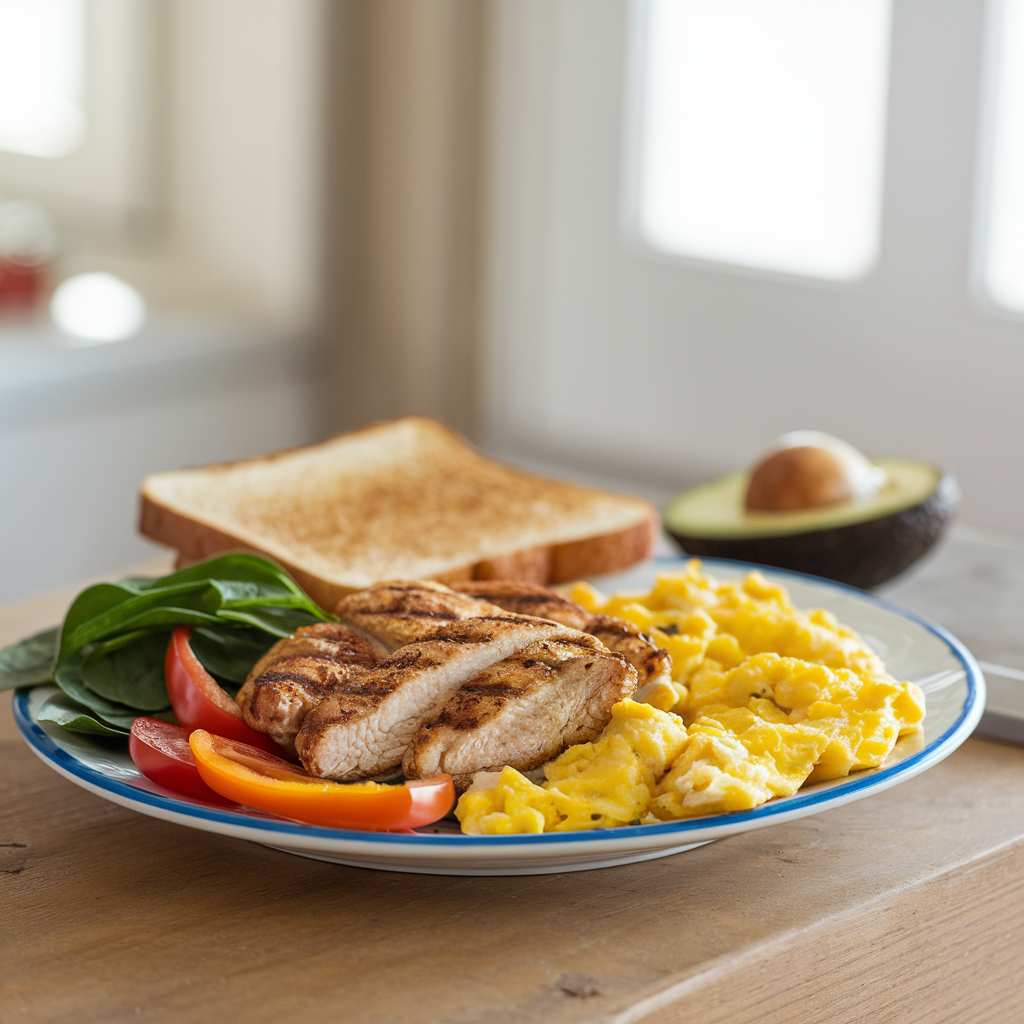Introduction
When we think of breakfast, our minds typically conjure images of cereal, eggs, toast, or oatmeal. However, over the last few years, more people have been incorporating unconventional foods like chicken into their morning meals. But the question remains: Is it healthy to eat chicken for breakfast?
In this article, we will explore the benefits and drawbacks of eating chicken for breakfast, consider its nutritional profile, and provide insights on how to incorporate it into a balanced morning meal. Whether you’re looking to mix up your breakfast routine or exploring protein-packed options, read on to discover if chicken deserves a spot on your breakfast plate.

The Rise of Savory Breakfasts
In many cultures around the world, savory breakfasts have been the norm for centuries. From eggs with bacon to steak and potatoes, a hearty, protein-filled breakfast has long been a tradition. However, in recent years, there has been a noticeable shift in the Western world towards healthier, more protein-focused breakfast options.
With the growing popularity of high-protein diets, such as the keto diet, paleo diet, and low-carb diets, many people are swapping out traditional sugary cereals or carb-heavy breakfasts for more substantial, nutrient-dense foods like chicken. This change has led to an increase in people asking whether it is truly healthy to eat chicken for breakfast.
Nutritional Benefits of Eating Chicken for Breakfast
Chicken is an excellent source of lean protein and provides a wide range of essential nutrients. Let’s break down the key nutritional benefits that make chicken a great option for breakfast:
1. High in Protein
Chicken is known for being a high-quality source of protein, which is crucial for muscle growth, repair, and overall body function. A single serving of skinless, boneless chicken breast (around 3.5 ounces or 100 grams) contains approximately 31 grams of protein. This makes it an excellent option for those looking to boost their protein intake early in the day, especially for those following low-carb or high-protein diets.
Why Protein is Important for Breakfast:
- Satiety: Protein helps you feel full for longer, which can prevent mid-morning cravings and help with weight management.
- Muscle Health: Protein is essential for muscle repair and growth, making it a great option for people who work out in the morning.
- Blood Sugar Regulation: Protein helps regulate blood sugar levels, preventing energy crashes later in the day.
2. Packed with Essential Vitamins and Minerals
Chicken is not just about protein—it’s also a good source of several key vitamins and minerals, including:
- B vitamins (B6 and B12): These vitamins are important for energy production, brain function, and metabolism.
- Iron: Essential for oxygen transport in the blood and preventing iron-deficiency anemia.
- Zinc: Supports the immune system, wound healing, and protein synthesis.
- Phosphorus: Vital for bone health and energy metabolism.
These vitamins and minerals play a vital role in maintaining overall health and can help improve your energy levels throughout the day, making chicken a well-rounded breakfast option.
3. Supports Weight Loss and Metabolism
Due to its high protein content, chicken can be beneficial for weight management. Protein is more thermogenic than fats or carbohydrates, meaning your body uses more energy to digest it. Eating a protein-rich breakfast like chicken can help boost your metabolism and promote fat-burning throughout the day. Additionally, protein keeps you feeling fuller longer, reducing the likelihood of snacking between meals.

Chicken for Breakfast: A Better Alternative to Traditional Options?
1. Traditional Breakfasts and Their Drawbacks
Traditional breakfast foods like cereal, pancakes, and toast are typically carbohydrate-heavy, with little to no protein. While these foods can provide a quick source of energy, they often lack the staying power needed to keep you full until lunchtime. Many of these breakfast options are also high in refined sugars or processed ingredients, which can lead to spikes and crashes in blood sugar levels.
In contrast, chicken provides a steady source of energy without the insulin spikes associated with refined carbs. This can be especially beneficial for individuals looking to maintain stable energy levels throughout the day.
2. Chicken vs. Eggs: Which Is Better for Breakfast?
Eggs are often seen as the go-to high-protein breakfast option, but how does chicken compare? Both foods are rich in protein and essential nutrients, but chicken has some distinct advantages:
- Higher Protein Content: Chicken contains more protein per serving than eggs. While one large egg contains about 6 grams of protein, a serving of chicken provides around 30 grams.
- Lower Fat Content: If you’re using skinless chicken breast, it contains less fat than eggs, particularly if you remove the yolk.
- More Versatility: Chicken can be used in a wider variety of breakfast dishes, from salads to sandwiches to wraps.
Both eggs and chicken are healthy choices, but chicken can offer a larger protein boost, making it a great option for those looking to maximize their morning intake of lean protein.
How to Incorporate Chicken into Your Breakfast Routine
If you’re convinced that chicken can make a healthy addition to your breakfast, here are some easy ways to incorporate it into your morning meals:
1. Chicken and Avocado Breakfast Wrap
For a delicious, filling breakfast, try a chicken and avocado breakfast wrap. Simply combine cooked, shredded chicken with avocado, leafy greens, and a whole-wheat tortilla. Add a sprinkle of cheese and a dash of hot sauce for extra flavor. This combination offers a balance of protein, healthy fats, and fiber to keep you full throughout the morning.
2. Chicken Salad with Fresh Vegetables
If you prefer a lighter breakfast, a chicken salad can be a refreshing option. Use grilled or roasted chicken breast, mixed greens, tomatoes, cucumber, and a light vinaigrette dressing. Add in some nuts or seeds for extra crunch and healthy fats. This low-calorie, nutrient-dense breakfast will keep you energized and satisfied.
3. Chicken and Veggie Scramble
For a hearty breakfast, prepare a chicken and veggie scramble. Sauté diced chicken with onions, bell peppers, spinach, and other vegetables of your choice. Scramble in some eggs or tofu for added protein and flavor. This dish is packed with vitamins, minerals, and protein—perfect for fueling your day.
4. Chicken Breakfast Bowls
Create a customizable breakfast bowl by combining chicken with roasted sweet potatoes, quinoa, leafy greens, and your favorite healthy sauce or dressing. This combination offers a delicious mix of protein, fiber, and healthy carbs, providing lasting energy and keeping you full for hours.
Potential Drawbacks of Eating Chicken for Breakfast
While chicken has many health benefits, there are a few things to consider before making it a regular part of your breakfast routine:
1. Sodium Content in Processed Chicken
If you’re using processed chicken products, such as pre-cooked chicken sausage or deli meat, be aware that these can contain high levels of sodium and preservatives. Excessive sodium intake is linked to high blood pressure and other cardiovascular issues. Always opt for fresh, unprocessed chicken when possible.
2. Heavy Meals Early in the Morning
For some people, eating a large, protein-rich meal like chicken early in the morning can feel heavy. If you’re not accustomed to savory breakfasts, it may take some time for your body to adjust to eating a heavier meal in the morning. Start with smaller portions and gradually increase as you get used to it.
3. Ethical Considerations
For those following a plant-based diet or those concerned about animal welfare, eating chicken may not align with their ethical beliefs. It’s important to consider your dietary choices and how they align with your values when incorporating new foods into your routine.
Frequently Asked Questions (FAQ) About Eating Chicken for Breakfast
1. Can I eat chicken for breakfast every day?
Yes, you can eat chicken for breakfast every day, as long as it’s part of a balanced diet. Chicken is a great source of lean protein, vitamins, and minerals, making it a nutritious option for the morning. However, it’s important to vary your meals to ensure you’re getting a wide range of nutrients. Pairing chicken with vegetables, whole grains, or healthy fats will create a more well-rounded breakfast.
2. Is it better to eat chicken breast or chicken thighs for breakfast?
Both chicken breast and chicken thighs can be healthy breakfast options, but they offer different nutritional profiles:
- Chicken breast is leaner and lower in fat, making it an ideal choice if you’re looking to limit your calorie and fat intake.
- Chicken thighs contain more fat but are also rich in flavor and can be more tender and juicy. If you’re not concerned about the extra fat and are looking for a flavorful breakfast, thighs are a great choice. In general, chicken breast is the healthier option for those looking to maintain a leaner diet.
3. Can I eat leftover chicken for breakfast?
Yes, leftover chicken is an excellent option for breakfast. It’s a great way to use up extra food from dinner and save time in the morning. Just make sure to store it properly in the refrigerator to maintain food safety, and reheat it thoroughly before eating. Leftover chicken can be added to salads, breakfast wraps, or scrambled eggs for a quick and nutritious meal.
5. What should I pair with chicken for a balanced breakfast?
To make your chicken breakfast more balanced, pair it with:
- Whole grains: Brown rice, quinoa, or whole-grain toast provide fiber and help keep you full.
- Healthy fats: Avocados, nuts, or olive oil add heart-healthy fats to your meal.
- Vegetables: Adding vegetables like spinach, bell peppers, or tomatoes provides fiber, vitamins, and minerals.
This combination will ensure your breakfast is nutrient-dense and will provide long-lasting energy throughout the day.
6. Is eating chicken for breakfast suitable for a keto diet?
Yes, chicken is an excellent option for a keto diet since it is high in protein and low in carbohydrates. You can pair it with non-starchy vegetables like leafy greens or cauliflower to keep the meal keto-friendly. Avoid adding too many high-carb ingredients like bread or potatoes to maintain the proper macronutrient balance.
7. Is eating chicken for breakfast good for weight loss?
Yes, eating chicken for breakfast can support weight loss. Chicken is rich in protein, which helps promote satiety, reduce hunger, and increase metabolism. A protein-packed breakfast, such as chicken, helps curb cravings and keeps you full for longer, reducing the likelihood of overeating later in the day. Just be mindful of portion sizes and choose healthier cooking methods like grilling or baking instead of frying.
8. Can I eat chicken for breakfast if I’m vegetarian or vegan?
If you follow a vegetarian or vegan diet, eating chicken is not an option. However, there are plenty of plant-based alternatives that provide similar protein content, such as tofu, tempeh, or seitan. You can use these plant-based protein sources in recipes that typically call for chicken, like breakfast wraps, scrambles, or salads, to enjoy a similar flavor and texture.
9. Are there any risks to eating chicken for breakfast?
For most people, eating chicken for breakfast is safe and healthy, but there are a few things to keep in mind:
- Food safety: Always store and reheat chicken properly to avoid foodborne illnesses. Chicken should be kept refrigerated and consumed within 3-4 days after cooking.
- Sodium levels: If you’re using processed chicken products, be cautious of added sodium, which can contribute to high blood pressure.
- Ethical concerns: If you follow a plant-based diet or are concerned about animal welfare, chicken may not align with your dietary preferences. Opting for plant-based protein sources is a good alternative.
Conclusion
So, is it healthy to eat chicken for breakfast? The answer is yes—chicken can be a highly nutritious and satisfying breakfast choice, especially if you’re looking to boost your protein intake and maintain stable energy levels throughout the day. It’s packed with protein, vitamins, and minerals, and can be used in a variety of breakfast dishes to keep things interesting.
However, as with any food, it’s important to choose fresh, unprocessed chicken and pay attention to portion sizes. If you’re looking to break away from traditional breakfast options and try something new, chicken could be the perfect addition to your morning routine.

